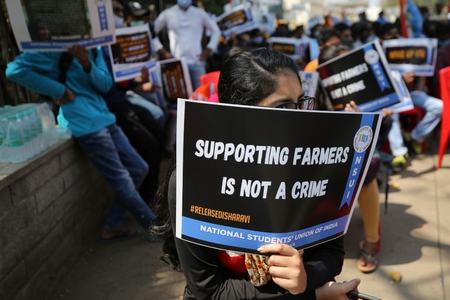The resignation of one of India's most prominent intellectuals and a fierce government critic from a top university has sparked student protests and worries about freedom of speech in the world's biggest democracy.
Pratap Bhanu Mehta, a respected scholar on political theory and constitutional law, had long been dismayed by Prime Minister Narendra Modi's government, firing off stinging editorials and speeches denouncing the “death of liberalism”.
The Oxford and Princeton alumnus had already stepped down as vice-chancellor of Ashoka University in 2019, reportedly because the trustees were worried by his outspoken views, but remained a political science professor.
But last week he threw in the towel, saying that the board of the university — founded in 2014 as a bastion of the liberal arts and India's answer to the Ivy League — saw him as a “political liability”.
“My public writing in support of a politics that tries to honour constitutional values of freedom and equal respect for all citizens, is perceived to carry risks for the university,” he said in his resignation letter.
Ashoka's founders met Mehta recently and said they could no longer protect him in the “current political environment”, the Indian Express daily reported.
According to the university's student newspaper, Mehta's resignation was endorsed by the board because it would speed up efforts to acquire land needed for an expansion.
'Political pressure'
The university has yet to comment on the controversy but matters escalated on Thursday when Arvind Subramanian, a former chief government economic advisor, resigned from Ashoka in solidarity.
That the university “can no longer provide a space for academic expression and freedom is ominously disturbing”, media reports cited his letter of resignation as saying.
Students have held several days of demonstrations at the Ashoka campus outside New Delhi, calling for a boycott of classes.
The university faculty also issued a statement saying Mehta's departure “raises urgent questions about the university's commitment to academic freedom as well as its internal processes”.
More than 150 academics worldwide including from Columbia, Yale and Oxford said in an open latter that they were “deeply distressed” that Mehta had resigned “under political pressure”.
They said that the values of “free inquiry, candour, and a rigorous distinction between the demands of intellectual honesty and the pressure of politicians, funders, or ideological animus ... come under assault whenever a scholar is punished for the content of public speech.”
'Electoral autocracy'
Under Modi, authorities have made increasing use of laws dating back to the colonial era to arrest people for “sedition” including a 22-year-old climate change activist last month.
Even comedians have felt the heat with one, Munawar Faruqui, arrested in January just before he went on stage on suspicion that he planned to insult Hindu gods.
Incoming social media rules could see any online content deemed objectionable removed within 36 hours and tech companies forced to disclose the origin of any “mischievous tweet or message”.
Indian democracy was this month downgraded to “partly free” from “free” by the Freedom House think-tank.
“Rather than serving as a champion of democratic practice and a counterweight to authoritarian influence from countries such as China, Modi and his party are tragically driving India itself toward authoritarianism,” Freedom House said.
The V-Dem Institute at the University of Gothenburg said in a recent report that India had turned into an “electoral autocracy”.
The government rejected the reports, with Foreign Minister S. Jaishankar hitting out at the “hypocrisy” of the “self-appointed custodians of the world”.














































